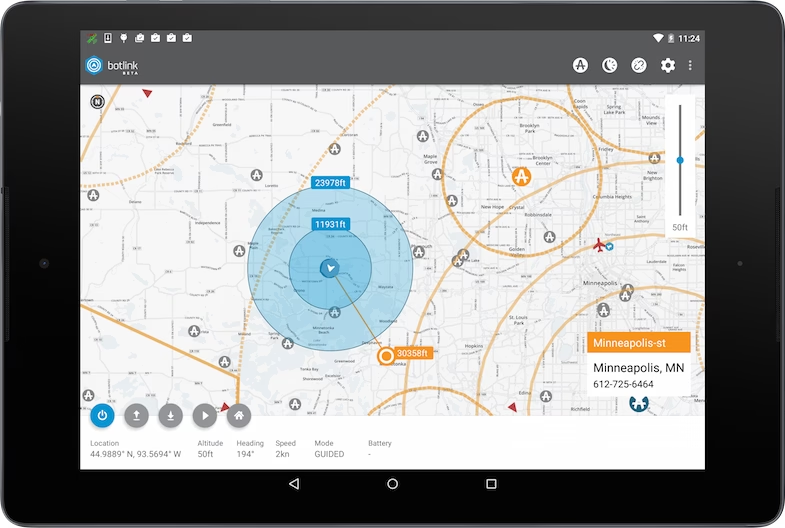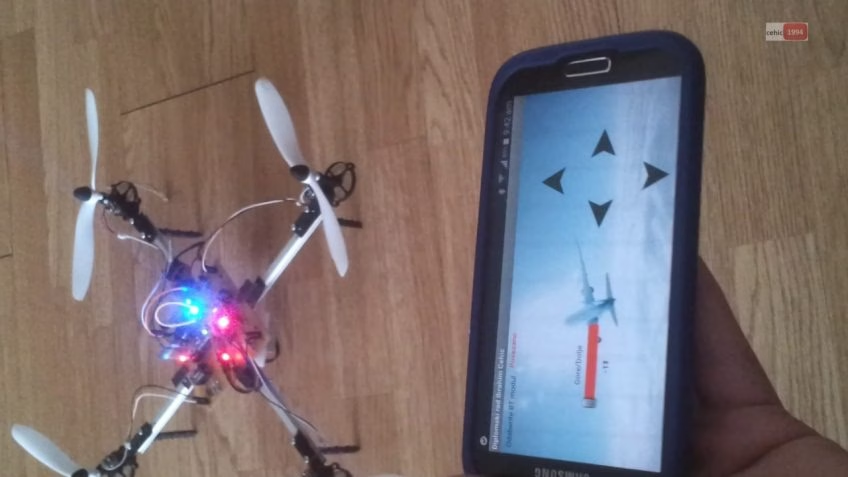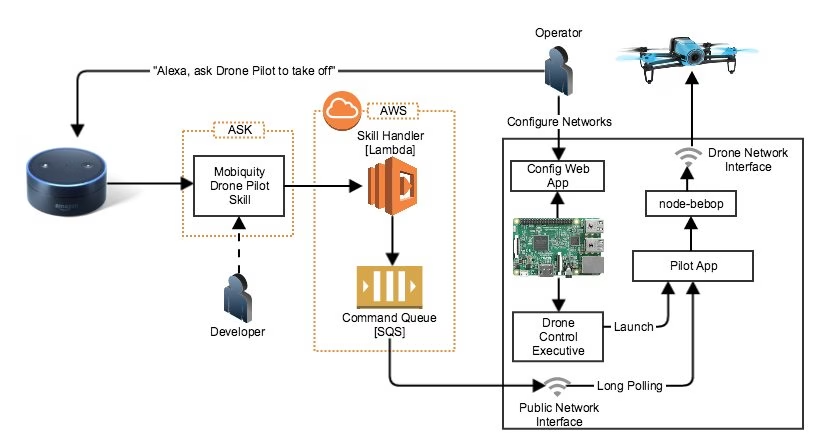Drone Software Development: How to Develop a Drone Control Application?
Interested in drone software development and exploring how to build a drone control application successfully?
In this article
- Examples of drone control apps
- Drone app features
- Drone software development approach
- Drone software development tools and guidelines
- How to differentiate your drone control app by smart drone programming
- The cost of drone software development project
- Frequently Asked Questions on drone software development
In this article, we will discuss how you can undertake a drone software development project in detail. But first, let's explore some drone control apps and their features to see what our target audience expects from such drone apps.
Before we start, let's have a look at some dron market statistics. For example, the global drone market revenue totals $4.4 billion in 2025, while the United States is leading this market. More stats can be found here.
Examples of drone control apps
I recommend you review the following drone applications to get great design ideas:
B4UFLY/ Dron control app
Federal Aviation Administration (FAA) in the US offers the B4UFLY app for drone control. It's available for both Android and iOS devices. This easy-to-use smartphone app enables drone operators to be informed about restrictions and location-specific requirements in their specific region.
The app has a status indicator that notifies operators if a region prohibits drones. The app informs the operators about the reasons for the prohibition. It offers a ’planner mode‘ for future drone flight planning. B4UFLY also offers informative and interactive maps. The app is free.
DJI Go/ Dron control app
This is another free app, however, it‘s very popular. Most drone operators know about this app, furthermore, they have both iOS and Android versions. The DJI Go app provides a live HD view from the drone. It tracks flight data, additionally, it offers many automated intelligent flight modes. Users can record and share videos.
Easy-to-use features like buttons on both the control and the smartphone app allow take-off and landing. The map is easy to follow so you can easily track the position of the drone.
This app stores flight data. It makes it instantly available to operators. The company provides good tutorials and manuals to reduce the learning curve.
UAV Forecast/ Weather forecast app
This is a simple app, furthermore, it‘s free. The UAV Forecast app is available on Android as well as iOS. It provides detailed weather conditions in the users‘ region. The app provides information about wind, precipitation, visibility, cloud cover, etc. Users can easily find out from this whether the weather is appropriate for flying drones.
If you're thinking about building a drone control application and looking for an expert development team, why don't you drop us a line? One of our tech account managers will contact you shortly to discuss your development needs.
Drone app features

Drone app users need apps to manage the control functions of their drones, hence, you need to offer comprehensive features in your drone control application if they are to use it. Following are essential features of such apps:
- The app should enable users to easily learn to fly drones.
- Users should be able to easily access your drone app's features.
- Flying a drone requires good weather conditions and a spot from where it can take off. Users need to find such places hence the app should assist users in this.
- I have already mentioned security concerns. Users should know about ’no-fly‘ zones, hence, the app should have a database for this.
- The app should include weather forecasts for the chosen flying region. Users can use these to decide whether to fly the drone now or later, etc.
- A flight log is important since it allows users to keep track of their drone flights.
- The app should feature a highly capable camera platform. Users should be able to move the camera and track objects.
- A good drone control application should track the necessary flight data to allow users to perform the required data processing and analysis later.
- Users will benefit if the app provides a training simulator. This way they can become familiar with the app even before they buy a drone.
- A digital awareness system is needed in the app so that you know if a manned aircraft is flying nearby.
- The app should allow you to create a recommended or preflight flight route for your drone.
- A good drone control application should automatically upload flight data to cloud-based servers as a secure backup.
- A simple UI where users can customize the controls is useful.
Read more about these desired features in “Top 10 Apps for Drone Pilots”.
Drone software development approach
In this article, we will recommend a few ’Software Development Kits‘ (SDKs) and ’Application Programming Interfaces‘ (APIs). Using these, or a combination of these, you can develop customized features for drone software. This custom development approach allows you to ensure that your drone app stands out from the competition.
You need to design the ’User Interface‘ (UI), furthermore, you need to develop the mobile app frontend. Of course, using SDKs and APIs will make this development a bit easier. To host the mobile app backend, I recommend you buy a ’Mobile Backend as a Service‘ (MBaaS). More on this later.
For managing this project, I recommend you use the ’Agile‘ methodology. To organize your team for an Agile development project, consult our guide on “how to build an Agile development team?”.

SDK/API options
Review the following SDK/API options so that you can make an informed choice about how to make a mobile app for drones.
Option #1: FlytBase SDK and API
FlyBase is a drone autonomy software platform.
FlytBase, the popular ’Internet of Drones‘ (IoD) platform offers their SDKs and APIs for developers to build drone control apps. There are several advantages of their platform, for e.g., unified APIs, interoperability, drone simulator, and enterprise-level scalability.
Additionally, the platform works with all prominent sensors, cloud services, and devices. The security in this platform is of enterprise-level. The company also has a suite of drone application solutions, e.g., security and surveillance, delivery, fleet management, warehouse management, etc. You might find one solution for your business use case.
Check out their solutions.
To access their SDKs and APIs, you first need to register with FlytBase. They have a few core products, e.g.:
- FlytOS: The intelligence component on an abstract layer over the drone hardware. You can use it for 3D modeling. FlytOS offers add-on plugins for video streaming, collision avoidance, etc.
- FlytCloud: Their cloud infrastructure offers telemetry, control, and video/payload data from the drone. Note that FlytOS provides seamless connectivity with FlytCloud.
- FlytPi starter kit: This is a turnkey companion computer pre-loaded with FlytOS and a FlytCloud subscription.
The company provides an Android SDK that is called ’FlytSDK‘. They also offer APIs and their entire documentation. You will need to contact them for their SDK and API pricing plans.
Option #2: DJI SDK and API:
DJI is a Chinese drone manufacturing company.
DJI offers mobile SDKs and API for creating drone control apps. You can create iOS and Android apps using them. You can incorporate the following features:
- High and low-level flight control;
- Aircraft state through telemetry and sensor data;
- Avoid obstacles;
- Camera control to take pictures according to your requirements;
- Live video feed;
- Remote access to media stored on camera;
- Mission control;
- Control of battery, remote controller.
Read more about their mobile SDK. You can access Android API references and the iOS API reference.
Depending on the drone device and platform you use, you may be able to expedite your development a bit more. DJI offers a few more additional SDKs, some of which support popular drone products like Spark series, Mavic series, Phantom series, etc. Check out these additional SDKs:
You need to register for their SDK and API. Contact DJI for the pricing information.
Option #3: Parrot SDK and API
Parrot is a drone software.
Parrot provides SDK and API for drone control apps, using which you can create a mobile drone app. Their SDK is free, additionally, there are sample code repositories for your review. With this SDK, you can build the following features into your drone control application:
- Connect with your drone;
- Pilot your drone;
- Receive streaming data;
- Save media and download, including images and videos;
- Send autopilot flight plans;
- Update your drone.
The SDK works with a wide variety of drone platforms. The SDK is developed using the popular programming language C. It provides libraries for Android and iOS. A drone simulator is included.
You need to sign-up with the Parrot developer platform to get the SDK. You can also view their Android and iOS sample projects in their GitHub repository.
Drone software development tools and guidelines

The UI design and development are important for any mobile app. It‘s even more important for a drone control application since users will typically have a steep learning curve. Your UI designers need to know mobile menu and navigation well.
Consult our guide “Mobile navigation menu examples” for more details.
Use the appropriate test automation framework for testing your mobile apps. You can use Appium, a popular mobile automation testing framework. Appium is based on the Selenium framework.
To expedite your project, I recommend that you use an MBaaS provider. This saves your entire mobile backend development and management effort. MBaaS providers take care of infrastructure, user management, database, security, persistent storage management, etc.
Google Firebase is a good choice, however, you can read our guide “How to choose the best mobile backend as a service (MBaaS)?” for more options.
Finally, you need to know how to publish your app in the app stores. There are key steps to follow here, e.g., you need to get a developer account. Check out the guidelines for Android and iOS.
Your team and project management
You should onboard a team comprising of business analysts, UI/UX designers, iOS developers, Android developers, and testers. I recommend that you use the ’Scrum‘ technique for project management.
In a scrum environment, you need a ’Scrum master‘, who is the project manager. The PM should be conversant with project management best practices.
Since mobile apps are ’Systems of Engagement‘ (SoEs), they require enhancement in iterations. This makes them good candidates for the scrum technique, where ’Sprints‘ act as such iterations. Each sprint has a set of features or requirements that are tracked in a ’Product backlog‘.
The team estimates features. They plan sprints and deliver them in an iterative manner. Read more about the scrum technique in our guide "How to build a Scrum development team?”. The team should also use effective tools for project management.
Trello is a good option, however, you can find more examples in our guide to Agile PM tools. Another thing to bear in mind is that it's crucial to build a minimum viable product (MVP) as it's a key component of the Agile development process.
How to differentiate your drone control app by smart drone programming
The drone industry is highly competitive. You need to offer unique features in your drone control app to make a mark in this market. Consider the following ways to do that:
1. Choose native mobile development over cross-platform development
We recommend you choose native mobile development. Native mobile apps offer a superior user experience, security, and performance over cross-platform apps.
Native mobile apps use the device-specific features well. You develop them with technologies that work effectively with the operating system in question.
Native Android development involves Java or Kotlin, and you develop native iOS apps with Swift. These languages tap into the strengths of the respective operating systems very effectively.
You can save costs by developing a cross-platform app. This allows you to run your app on Android and iOS with one codebase. However, cross-platform apps can’t fully match the native user experience, performance, and security.
2. Pay attention to the user interface (UI) during drone software development
Users of your drone control app need an effective UI. I recommend you consult the platform-specific guidelines to design and develop your app's UI.
Use the “Material Design” guidelines when designing your Android app UI. When designing the UI of your iOS app, use the “Human Interface Guidelines”.
3. Keep abreast with the new developments in the drone industry
Plenty of research and development takes place in the drone industry. Take the example of the new algorithms that enable drones to undertake obstacle avoidance. These algorithms help drones to fly faster around obstacles.
There is also a new algorithm that helps a drone to fly faster than human racing pilots. In this case, external cameras give real-time position information. The algorithm then calculates time-optimal trajectories. Keep yourself abreast with these developments, which will help you to offer differentiators.
4. Test your mobile apps with a cloud-based mobile devices lab
Your proposed drone control app should work on all relevant mobile devices. To ensure this, you need to test it against a wide range of mobile devices and browsers.
We recommend you use the Digital.ai web and mobile cloud testing lab. With it, your team gets access to hundreds of real devices on the cloud to test on.
5. Pay attention to the non-functional requirements during drone software development
You need to take care of the non-functional requirements (NFRs) too. I refer to scalability, performance, security, maintainability, etc.
Choose software solutions that help you to meet NFRs. E.g., you can use scalable SQL databases like MySQL or PostgreSQL. Use MongoDB or Apache Cassandra if you need a scalable NoSQL database.
6. Make yourself familiar with the rich ecosystem of drone technology offerings and solutions
There’s a growing ecosystem of drone solutions. This includes drone hardware and software solutions. You can also access excellent documentation.
Check out the following examples:
A. The projects supported by the Dronecode Foundation
The Dronecode Foundation is a part of the Linux Foundation. It supports valuable projects that facilitate the growth of the drone industry.
Review them. These are open-source projects, which can help your project.
An example is MAVLink. This a lightweight message library for communications between drones and ground control stations. MAVLink has message-set specifications. It also offers Python tools to convert them into source code for popular languages like Java, Swift, JavaScript, etc.
B. AirSim: A simulator for drone software development
Do you also plan to offer a simulator for drones along with a drone control software application? You can get ideas by reviewing AirSim. The developers of this platform utilized AI, Machine Learning, Deep Learning (DL), Computer Vision, Reinforced Learning, embedded software technologies, etc.
AirSim also supports Lidar sensors. Lidar sensors can collect high-quality data when used in drones, therefore, they are popular.
C. DroneMapper
Looking for an image processing software solution for your drone control app? Evaluate DroneMapper. The company provides two licensed software products for this, named “REMOTE EXPERT” and “RAPID”.
The cost of drone software development project
This project has quite a few cost components, as follows:
- SDK/API: A few SDK/API options we have listed are free whereas you need to contact the other providers for their pricing plans.
- MBaaS providers always list their pricing plans on their websites.
- Development effort varies based on your requirements, furthermore, your local labor market will influence the development manpower cost.
Depending on the availability of software developers in your local labor market you may need to get remote professional help. Check our guide "How to find the best software development company?” for more details.
Final thoughts on drone software development
A Grand View Research report states that the global commercial drone market will grow at a CAGR of 57.5% during the 2021-2028 period. A report from Markets and Markets estimates the global drone services market will grow from $13.9 billion in 2021 to $40.7 billion by 2026. The report projects a CAGR of 23.8% during this period.
These stats show that the time is right to tap into the drone software industry. You can expect a great deal of return on investment given the growing popularity of drone technology.
However, to build a robust and secure drone app that conforms to the industry standards based on cutting-edge technologies, you will need a team of competent software developers with high-quality software development skillsets.
If you do not find such talent in your project team and need help to develop a drone control app, contact DevTeam.Space. A dedicated account manager will get back to you instantly and explain how we can help.
DevTeam.Space is an innovative American software development company with over 99% project success rate. DevTeam.Space builds reliable and scalable custom software applications, mobile apps, websites, drone control apps and drone control software, live-streaming software applications, speech recognition systems, ChatGPT and AI-powered solutions, and IoT solutions and conducts complex software integrations for various industries, including finance, hospitality, healthcare, music, entertainment, gaming, e-commerce, banking, construction, and education software solutions on time and budget.
DevTeam.Space supports its clients with business analysts and dedicated tech account managers who monitor tech innovations and new developments and help our clients design, architect, and develop applications that will be relevant and easily upgradeable in the years to come.
Frequently Asked Questions on drone software development
Kittyhawk is an excellent app for general-purpose drone use such as site surveying, search and rescue missions, etc. However, if you want specific features, you might need to create your own application.
Provided that you have development experience then you can build a drone app. You will need to onboard experienced developers from a company such as DevTeam.Space in order to do so.
You can find experienced developers at DevTeam.Space. The platform has years of experience developing world-class applications such as these.


